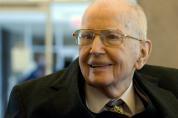A Celebration of the Mind and Work of Ronald Coase

In keeping with the Law School's long tradition of combining the studies of law and economics, a conference was held on December 4th and 5th to discuss the research of one of the most influential thinkers in the world of the social sciences-Ronald Coase, Clifton R. Musser Professor Emeritus of Economics at the Law School.
An extraordinary group of scholars from all parts of the world gathered to celebrate the 50th anniversary of the publication of his paper, The Federal Communications Commission. This year also marks the 50th anniversary of the publication of Professor Coase's seminal paper, The Problem of Social Cost. When papers from the conference are published next year, it will mark Coase's 100th birthday.
The conference, entitled Markets, Firms and Property Rights: A Celebration of the Research of Ronald Coase, brought together scholars from three continents. The presentations ranged from analyses of the continued importance of The Federal Communications Commission in countries from New Zealand to China to Great Britain, to reviews of the continued influence of his most famous work.
"Citations measure a scholar's influence," noted Law School Professor Emeritus William M. Landes and Sonia Lahr-Pastor in their presentation Measuring Coase's Influence. "That Ronald Coase is among the most influential and best cited economists in the past 50 years is not debatable. Two of his articles-The Nature of the Firm, published in 1937, and The Problem of Social Cost, published in 1960-are among the most-cited articles in both economics and law and continue to be widely cited."
Coase's influential argument, called the Coase Theorem, states that the allocation of property rights does not matter for economic efficiency, so long as they are well defined and a free market exists for the exchange of rights between those who have them and those who do not. It has influenced economic and legal thought and policy worldwide, and in 1991, earned Coase the Nobel Prize in Economics.
Although now approaching his second century, Coase is still active in the academic world. He is currently organizing the Summer 2010 Chicago Workshop on the Structure of Production.
Coase addressed conference attendees through a video in which he discussed the topic and title of the conference. In referring to his well-respected 1937 paper, The Nature of the Firm, Coase explained that by studying concrete situations, he came to the conclusion that firms do not operate exclusively by contract, as one might think, but rather by relationships.
Speakers at the conference included, Thomas Hazlett of George Mason University, who along with David Porter and Vernon Smith of Chapman University offered Radio Spectrum and the Disruptive Clarity of Ronald Coase, which examines the FCC paper. The writers concluded that while market allocation of radio spectrum has remained in the control of the U.S. government, consumers, innovators and industry would benefit from a liberalization of its extension. Consequently, these competing forces will determine whether Coase's work will be able to drive spectrum property reforms to the furthest frontiers of efficiency.
Judge Richard A. Posner, a senior lecturer at the University of Chicago Law School, presented Keynes and Coase, which began with the words, "I am sure that Ronald will not like my bracketing him with Keynes, as I am about to do. But if he is patient, he will hear me modify criticisms of his approach to economics that I made in an essay I wrote many years ago-16 to be exact-for the Journal of Economic Perspectives."
Overall, the conference was an enormous academic and personal success.
"Ronald Coase is one of the greatest thinkers in the history of law and economics," Law School Professor Geoffrey R. Stone notes. "The persons gathered at this conference celebrated, challenged and explored the implications of his unique insights. It was especially meaningful that at the age of 99, Ronald was able to be there to enjoy the event."